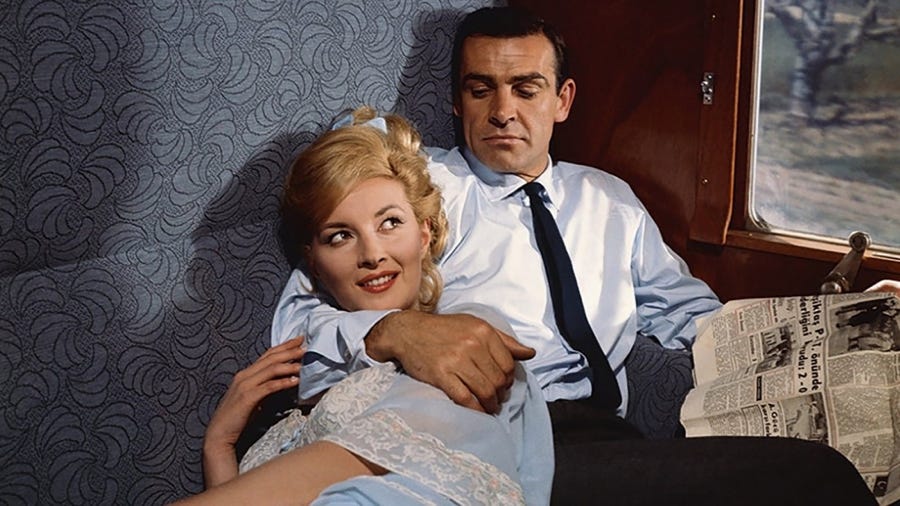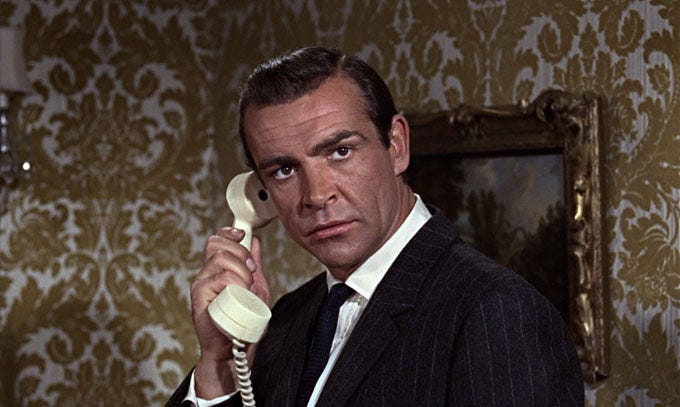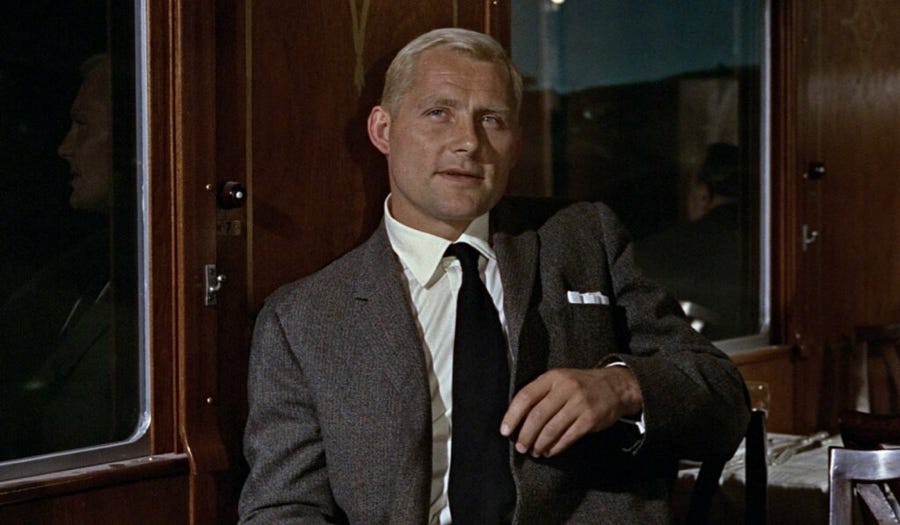From Russia With Love (1963)
"Red wine with fish. Well, that should have told me something..."
The man had taken off his mackintosh. He was wearing an old reddish-brown tweed coat with his flannel trousers, a pale yellow Viyella summer shirt, and the dark blue and red zig-zagged tie of the Royal Engineers. It was tied with a Windsor knot. Bond mistrusted anyone who tied his tie with a Windsor knot. It showed too much vanity. It was often the mark of a cad.
Ian Fleming, From Russia With Love (1957).
The Orient Express is the most famous train in history: a vehicle for murder, mystery and romance. The fame of its illustrious passenger list, real or imagined, reads like a Who’s Who of twentieth century political and social history: Tsar Nicholas II, Carol II of Romania, Mata Hari, Marlene Dietrich, Alfred Hitchcock, Trotsky, Diaghilev, Josephine Baker, Paul Theroux and Alan Whicker all took The Orient Express; Van Helsing takes it in Dracula (1897), Graham Greene uses it twice: in Stamboul Train (1932) and Travels with My Aunt (1969); Charlie’s Angel, Cheryl Ladd, finds love on it— in the imaginatively named Romance on the Orient Express (1985), and of course, in 1934, Agatha Christie sets her ingenious whodunnit amongst the luxurious coaches of the Compagnie Internationale des Wagon-Lits (a suitable place for skullduggery and intrigue), later made into the film of 1974 (forget the remake). And James Bond. In Ian Fleming's From Russia With Love (1957), Bond takes the Orient Express from Istanbul, alongside the beautiful Russian agent, Tatiana Romanova, travelling under the names of Mr. and Mrs. David Somerset.
1963 was a seminal year. A year of tragedy and sensation: the assassination of John F. Kennedy, the Profumo Scandal, the resignation of Harold Macmillan, and the introduction of the push-button telephone in America. And on the 10th October, From Russia With Love premiered at the Odeon, Leicester Square, the second film in the Bond franchise. From Russia With Love (1957) is often cited as one of JFK's all-time favourite books, alongside Barbara Tuchman's The Guns of August (1962), Duff Cooper's Talleyrand (1932) and Lord David Cecil's The Young Melbourne (1939)— a tale of aristocratic Whig debauchery. Clearly, Kennedy had anglophile tastes. And it's an interesting concept, thinking about it— that 1960s reinvention of 18th-century aristocratic life: it's very David Hicks. Gambling at the chemmy table, The Clermont Club in Berkeley Square, girls coming out of cakes. In Living with Design (1979), Hicks recalls life at his country house, Britwell, in South Oxfordshire, during the 1970s:
In the late 1960s inflation began to rear its ugly head. The process of cutting down the staff was a gradual one. The first person to go was the footman, and it was sad no longer to see polished brass buttons and the butler in white tie and tails. But of course, the fewer people you employ the simpler life is: and although we had lived in a pretty grand way in the early sixties, right from the outset I had tried to be practical. I had, for instance, installed a house telephone so that we could ring the groom to say when we wanted to go out riding.
David Hicks, Living with Design (1979).
So we need to rewind the metaphorical clock, before a time when Bond looked like somebody come to mend your washing machine or a model for a cashmere cardigan commercial, before muscled torsos (sans chest wig) and tight Tom Ford suits, Union Jack parachutes, invisible BMWs, Japanese digital watches, or the blow-dried quippery of Mr. Brosnan and Mr. Moore— to a time when a Pound Sterling bought you something close to three Dollars, a time when Bond was a very different beast, a very different beast indeed. Fleming wrote his first novel, Casino Royale, in 1952, pre-Suez, a book published in a small print run as a favour to Ian's brother, the soldier and travel writer Peter Fleming, a Hatchard's book for the carriage trade, at a time when Britannia still ruled the waves (sort of), when the Royal Navy could boast nine aircraft carriers and 145,000 sailors (a post-war peak) and the British Government planned to keep calm and carry on in Africa, as before, despite the loss of India.
Fleming imagined Bond as a bland agent of government, a Bentley driving, sacked Old Etonian, a civil servant, a reserved, clubbable, upper-class pen-pusher, the drudgery of an office existence enlivened with periods of extreme danger, snobbery, sex, masochism, materialism and schoolboy excitement. An Officer (RNVR), a Gentleman and a member of Blade's. Actually, a bit like David Niven— in real life, a hardened professional soldier. Niven, it is said, was Fleming's preferred choice for Bond. Niven did eventually play 007, even if it was only as the retired gentleman agent in the amusing porridge which is Casino Royale (1967). Step forward Sean Connery— dismissed initially by Fleming as having the looks of a 'Glaswegian lorry driver', yet immediately recognised by the Eon producers as having 'grace of a panther', and once director Terence Young (an Old Harrovian and former Guards officer) had smoothed out the rougher edges— playing a sort of Bondian Professor Higgins to the thirty-one-year-old Scot— Connery's Bond became the prototype for the Bond we all know and think we love. From the dyed toupée to the natural elegance of the Conduit Cut, the Anthony Sinclair suits, the Turnbull & Asser cocktail cuffs and the Scots brogue. But still, one step removed from Fleming's original concept.
In From Russia With Love (1963), SPECTRE seeks dastardly revenge on MI6 for the death of Dr. No and sets up British and Soviet intelligence to lure Bond into a trap, using the desirable (blonde) Russian agent, Corporal Tatiana Romanova (Daniela Bianchi), a protégé of former SMERSH big-wig, Rosa Klebb (Lotte Lenya) as bait. And along the way, there's a sort of code-breaker machine, presumably inspired by Enigma.
Towards the end of the film, Bond makes contact with a supposed British operative (Robert Shaw) on the Orient Express. The film is more or less faithful to Fleming's original narrative, spread over several memorable pages, where the upper-class (ish) Bond immediately clocks the middle-middle-class Captain Nash. Fleming's as sharp as a razor:
He extracted a visiting card and handed it to Bond. It said ‘Captain Norman Nash’, and in the left hand bottom corner, ‘Royal Automobile Club.’…
As Bond put the card in his pocket he slipped his finger across it. It was engraved…
Nash, alas, smokes Virginian cigarettes (presumably from the packet), as opposed to Turkish (from a cigarette case), a social faux pas; consistently addresses Bond as 'Old Man' and holds his knife 'like a fountain pen and frequently wiped it on his fork'. The only thing missing is an MG, a Surrey pub and a pair of Cavalry Twills: 'they certainly had to make do with some queer fish in the service these days. How the devil did this man manage to get along in the semi-diplomatic society he would have to frequent in Trieste?'
Fleming is deeply amusing— Nancy Mitford might have approved. The humour is as subtle, bone-dry, and as dead-pan as the Dover Sole on Captain Nash’s plate, which he drinks with red Chianti, and unless you happen to possess a British passport and/or are approaching the final years of Late Youth, all of this might pass you by. The supposed humour of the films is entirely different. No toe-curling asides in Fleming’s original books.
After the slightly uncertain start in Dr No (1962), the Bond series is beginning to find its feet. It’s all there, in place— or most of it. The fluffy white Persian, the international glamour girls with the ‘how d’ya say accents’: ‘Shames, pleeeez, make lurrrve to me..’, the exotic locations, Venice and Istanbul; Q branch’s miraculous briefcase, the puerile quips and brutal fights, the anonymity of the hotel room, sinful luxury the reward for pain and torture— and Germany’s temple to the Butch, the fabulous Rosa Klebb, plus hardman, Robert Shaw. I’m a huge fan of Shaw. His performance as Lord Randolph Churchill in Young Winston (1972) is one of the best things on celluloid. Ever. And, in From Russia With Love, we get the Bondian titles for the first time, the dancing girls set, in silhouette, against John Barry’s music. And to finish, one of the best Bond songs of the lot— Lionel Bart’s From Russia With Love, sung by our very own Matt Monro, the singing bus driver, Britain’s answer to Nat King Cole, with a fabulous voice as smooth as treacle. From Russia With Love (1963). It’s a buy. But it’s the Orient Express you remember.
Having spent twenty minutes tearing my hair out trying to find my DVD, I ended up renting From Russia With Love (1963) on Amazon Prime Video digital download. It is, of course, also available to watch on DVD and Blu-ray. And there’s a special edition for Bond aficionados.
You’ve just been reading a newsletter for both free and 'paid-for' subscribers. I hope you enjoyed it. Thank you to all those of you who have signed up so far.
There are two options on Luke Honey’s WEEKEND FLICKS. Cinema for Grown Ups: ‘Paid-for’ subscribers get an extra exclusive film recommendation every Friday morning, plus full access to the complete archive— which is currently at film no. 78, and should list over a hundred films by the end of the year. It costs £5 a month (or £50 a year)— a bargain, frankly, when you compare it to a few cups of coffee, a packet of semi-legal gaspers, or a pint of beer in the pub. ‘Free’ subscribers get access to the Sunday newsletter, plus the ‘free subscriber’ films in the archive. Either option is a good bet. And when I get my act together, I’m planning to add a spoken voiceover (mine!) for paid subscribers.
I will be back next Friday. In the meantime, I hope you have a relaxing, cinematic, and Dry Martini-fuelled Sunday. Stirred not Shaken.








My husband’s favorite Bond film, specifically for his panther-like grace whilst inspecting his hotel room. I always appreciate your cultural commentary in these reviews. Well worth the price of admission. Best Substack investment I’ve made.
From Russia With Love is one of the best films: gadgetry under control, Connery looking brilliant and a star turn by Pedro Armendáriz as Ali Kerim Bey. Plus Lotte Lenya! Literally Kurt Weill’s widow! How mad is that?